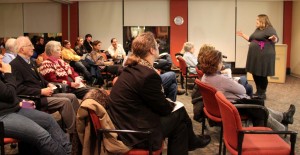By KYLE DONELLY
Contributing Writer
Professor Jacqueline Gehring of the political science department delivered to the students and faculty in attendance a brief lecture describing her research on Jan. 31.
The lecture was one part in a series of faculty lectures organized by Dr. Bradley Hersh, a professor of biology, whose purpose is to provide an informal venue for faculty to describe their research to students.
The faculty lecture series has been a collaborative effort of communication between student and faculty for decades, but historically, it was exclusive to the departments in the humanities division. Over time, the series expanded to include speakers from all departments. Two years ago, former Professor of English at Allegheny College, Dr. Aisha Lockridge, who formerly coordinated the lecture series, appointed Hersh to the task. Hersh has filled that role ever since.
“For the past two years, we’ve tried to integrate some annual themes into talks,” said Hersh.
The lecture delivered by Professor Gehring on Wednesday fit very well into this year’s annual theme of civil rights.
Professor Gehring’s lecture pertained to the pursuit of civil rights by various European countries. One such country was Germany, where activists for disabled people have been implementing tactics employed by Americans in the Black Civil Rights movement of the 1990s.
Although the activists have won the majority of their cases, the movement itself is not very strong.
“Legal decisions on their own do not create the change we wish to see,” said Gehring.
In fact, Gehring argues that litigation, or the process of taking legal action, alone is not enough. Civil rights movements should include other strategies besides litigation, such as lobbying, raising consciousness and publicity. This is the reason, she argues, that the movement in Germany is considerably weak.
Conversely, Gehring spoke of a different movement involving one of the most discriminated groups in Europe: the Romani people.
The Romani people migrated from India to various parts of Eastern Europe, such as Italy, Germany, Hungary, Romania, and the Czech Republic. They are ostracized from European society, assumed to be mentally disabled, and subjected to slavery, genocide, and cruelty.
Although activists supporting the Romani people have won very few court cases, the movement is at large considered to be dynamic. Despite the absence of litigation, the movement has been successful because of other tactics employed by activists, such as raising public awareness, which supports Gehring’s argument.
Gehring concluded her speech by placing the situation into context by asserting that Americans have a responsibility to the Romani people, as well as other groups that have been discriminated against. She asserted that Americans, having discovered and implemented democracy, have an ethical duty to export ideas of democracy, rule of law, and equality to all those in need of it.
“Knowing you have a right and believing you can change [an adverse situation] can transform someone,” Gehring concluded.
The next lecture in the Faculty Lecture Series will be on Mar. 12 at 7:00 p.m. in CC 301/302. The speaker will be English professor Ben Slote, whose lecture is titled “The Messiness of Civil Rights: What Justice Looks Like in the Land of Employment Discrimination”.





